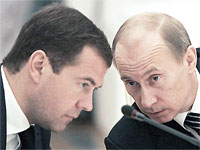Most Russians See No Difference Between Medvedev's, Putin's Policies - Poll
Interfax - 3.29.12 - JRL 2012-55
Moscow, 22 March: Almost half of (polled) Russians have given a positive evaluation Dmitriy Medvedev's work as Russian president, sociologists say, citing the results of their research.

file photoSpecialists from the Public Opinion Foundation (FOM) said on Thursday (22 March) that a national survey carried out in March showed that 41 per cent of respondents saw more successes than failures in Medvedev's work at the top state post. Conversely, 23 per cent thought that there were more mistakes than wins in the actions of the president, while 35 per cent were unable to judge the work of the head of state.
In 2008 (sociologists ran a similar survey in November), Medvedev looked a 'dark horse' to more than 50 per cent of Russians: 60 per cent of those polled were unable to stay whether he worked well or not. A positive assessment of Medvedev's actions came from 33 per cent at that stage, 7 per cent did not approve.
In the years of his presidency, Medvedev's work enjoyed the greatest support from Russians in 2010 (46 per cent) - thus the number of such people has fallen over the past two years, sociologists noted. The greatest fall has been registered this year: in 2009, 16 per cent of respondents spotted more flops than successes in the president's work, and 14 per cent in 2010.
Among the most notable of Medvedev's accomplishments, FOM respondents pointed to an improvement in the standards of living (growth in salaries, pensions, welfare payments) - 8 per cent, an improvement in the stability in the country - 5 per cent, foreign policy successes (in particular, an increase in Russia's global authority) - 5 per cent, the resolution of social problems - 4 per cent, and so on.
As regards the key errors of the incumbent president, respondents pointed to a lack of change for the better (6 per cent said they saw no results from his work), poor social policy - 5 per cent, economic downturns and improper economic policy - 4 per cent, growing corruption - 4 per cent, health care and education problems - 3 per cent, and others.
Two per cent said the continuity or Vladimir Putin's course and successful work with him was one of Medvedev's achievements, while 3 per cent said that the president's lack of independence was a flaw.
Seventy-two per cent of respondents saw no difference between Medvedev's policies and the course pursued by Putin as president. Ten per cent saw minor differences, 3 per cent said the differences were significant. Fifteen per cent were unable to answer.
Nevertheless, for the most part, Russians are happy with the work of the current head of state. Asked if Medvedev's actions lived up to people's expectations four years ago when he took up the presidential office, 44 per cent answered affirmatively (in November 2008, there were 55 per cent such respondents, in March 2009 - 52 per cent, in March 2010 - 55 per cent).
Medvedev dashed the hopes of 34 per cent of respondents (20 per cent in 2008, 27 per cent in 2009, 26 per cent in 2010). Around one-quarter of Russians were unable to state their view (21 per cent now, 25 per cent in 2008, 21 per cent in 2009 and 23 per cent in 2010).
FOM sociologists carried out the survey on 17-18 March in 100 settlements in 43 Russian territori